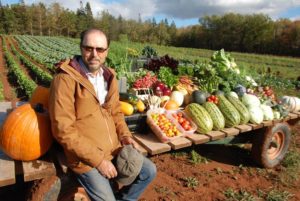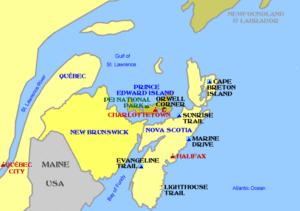November 01, 2019

Aman Sedighi gave up on the Islamic Republic and moved to Canada where he is now a farmer.
He loved agriculture, but he didn’t love the restrictions on women in the Islamic Republic that he felt were holding back his wife and daughter.
Sedighi, 61, moved to Canada’s tiniest province, Prince Edward Island, commonly known as PEI, in late 2010 with his family through the Provincial Nominee Program, leaving behind a career as an agricultural researcher with the government of Iran and bringing his business of exporting pistachios to a halt.
He was determined to find work in his beloved field of agriculture in a country that would free his wife, Azam, and the couple’s daughter, Farnaz, from Iran’s severe restrictions.
Sedighi beams at the good fortune of his 18-year-old daughter, who is in the nursing program at the University of PEI, and his son, Sina, 28, who is studying medicine at Dalhousie University in next door Nova Scotia province.

into a corner of Atlantic Canada north of Maine.
He is quite pleased, too, with his own progress since setting foot on – and plowing into – red PEI soil.
First, he worked 18 months on a dairy farm, with milking and feeding cows among other farm duties.
Along the way, Sedighi started growing vegetables on a small parcel of land. He took some of his herbs to Papa Joe’s restaurant in Charlottetown, the tiny provincial capital, where he says executive chef Irwin MacKinnon raved about the quality and freshness of his product.
Sedighi decided at that moment he wanted to grow fruits and vegetables for a living and a lifestyle.
“I found my way,’’ he told The Guardian of PEI. “I found my job…. It was my dream.’’
He searched across Prince Edward Island for a prime place to grow. In February 2014, he bought 14.5 acres (six hectares) of land, purchased a small tractor and got to work.
Sedighi started by planting herbs and 100 apple trees. He gradually added fruits and vegetables.
His business, called A-OK Gardens, has grown 500 percent over the first five-plus years.
Today, he grows a dizzying variety of products on 20 acres (eight hectares), including three kinds of zucchini, cucumbers, water melons, fava beans, mint, eggplant, cabbage, red onions, beets, carrots, parsley, lettuce, cauliflower, broccoli, three kinds of peppers, oregano, garlic, leeks, chives, snow peas, kale, beans, strawberries, tomato and asparagus.
Sedighi says he speaks to his plants every day. He stops, then corrects himself. It is the plants, he says, that tell him what they need. “They need many, many things,’’ he says.
Mike Buchanan, assistant manager of Harvest Wholesale, says, “We’re very fortunate to have such a great farmer on our team…. He grows a tremendous product. He takes pride in his work.’’
Most of Sedighi’s product is purchased by Harvest Wholesale, but he also continues to sell his food to Papa Joes, which helped set his farm business in motion.
His business employs five people, including two refugees from Syria, making him proud to be able to help fellow immigrants.
Syrians Mounir and Nisrine Alkernazi moved to PEI with their son, Fajr, four years ago and live in Charlottetown. The couple has been working full-time for Sedighi for the past three years.
“We are enjoying the work here – difficult work,’’ says Mounir, who owned a fruit farm in Syria and hopes to one day own a fruit and vegetable farm on PEI.
Sedighi hopes many will benefit from his diverse farm. He wants to show by example that much can be grown on Prince Edward Island, which if known throughout North American only for its huge potato crops and has a population of only 150,000 people.
“The Island – this soil – has the capacity to produce many, many things we import from the mainland,’’ he says. “We can produce here many things we need.’’
